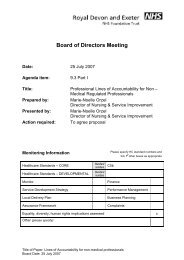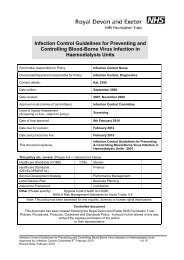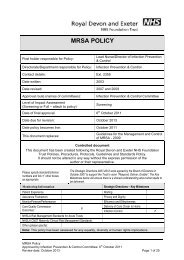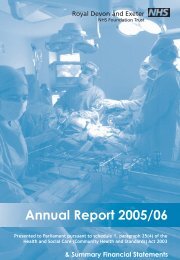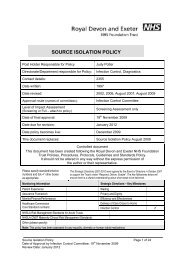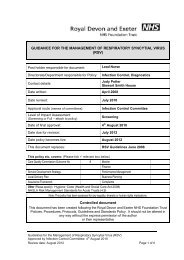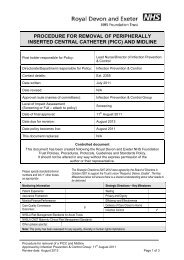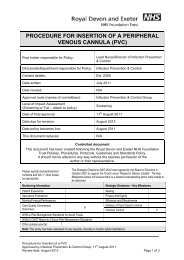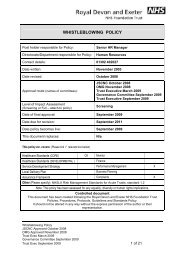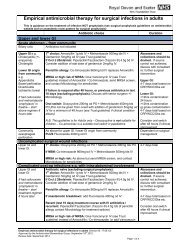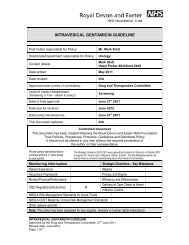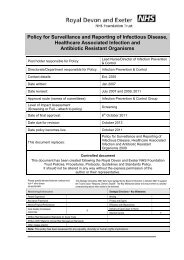Annual Report and Accounts 2012/13 - Royal Devon & Exeter Hospital
Annual Report and Accounts 2012/13 - Royal Devon & Exeter Hospital
Annual Report and Accounts 2012/13 - Royal Devon & Exeter Hospital
Create successful ePaper yourself
Turn your PDF publications into a flip-book with our unique Google optimized e-Paper software.
80 4. Our Governance<br />
<strong>Royal</strong> <strong>Devon</strong> <strong>and</strong> <strong>Exeter</strong> NHS Foundation Trust<br />
<strong>Annual</strong> <strong>Report</strong> <strong>and</strong> <strong>Accounts</strong> <strong>2012</strong>/<strong>13</strong><br />
Remuneration <strong>Report</strong><br />
The Executive Director Remuneration Committee<br />
(EDRC) comprises the Chairman <strong>and</strong> all the<br />
Non-Executive Directors.<br />
The Chief Executive <strong>and</strong> Director<br />
of Human Resources are invited to<br />
attend the meetings in an advisory<br />
role <strong>and</strong> are excluded on issues directly<br />
relevant to them by the Chairman of<br />
the Committee. The Committee is<br />
chaired by David Wright, the Senior<br />
Independent Director. The Committee<br />
is supported by the Trust Secretary.<br />
The Committee’s main purpose is<br />
to set rates of remuneration, terms<br />
<strong>and</strong> conditions of service for the<br />
Chief Executive, Executive Directors<br />
<strong>and</strong> Directors, i.e. those persons in<br />
senior positions having authority or<br />
responsibility for directing or controlling<br />
the major activities of the Trust.<br />
The Committee’s work is guided by<br />
a policy framework for Executive<br />
Director remuneration <strong>and</strong> conditions.<br />
The policy sets out a framework by<br />
which the EDRC will manage the<br />
remuneration <strong>and</strong> terms of service<br />
of the Chief Executive <strong>and</strong> Executive<br />
Directors. The policy details the<br />
approach that the Committee will take<br />
to executive remuneration, how the<br />
policy will be applied, <strong>and</strong> the duties<br />
<strong>and</strong> responsibilities of key staff. The<br />
policy allows a reasonable level of<br />
flexibility on which the members of<br />
the committee will apply their best<br />
judgements in reaching conclusions<br />
about the remunerations of Executive<br />
Directors. Although the policy<br />
provides a framework for determining<br />
remuneration for Executive Directors,<br />
once again this year, the Committee<br />
has, in effect, suspended the application<br />
of the policy. This was on the basis<br />
that the political <strong>and</strong> economic context<br />
meant that it was not possible to move<br />
the remuneration packages of the<br />
Directors towards the median point.<br />
In reviewing salary levels during the<br />
year, <strong>and</strong> taking into consideration the<br />
prevailing external policy environment<br />
<strong>and</strong> using the evidence gained from<br />
the updated comparator information,<br />
the Committee took the view that<br />
there would be no adjustments made<br />
to the salary levels of the Executive<br />
Directors. In doing so, the Committee<br />
were cognisant that the benchmarking<br />
data again demonstrated salaries were<br />
significantly below the peer group.<br />
Despite this, <strong>and</strong> in view of the pay<br />
freeze for all other staff groups, the<br />
policy was, in effect, suspended.<br />
In taking this view, the Committee<br />
recognised the low comparative salary<br />
levels exposed the Board to a degree<br />
of risk in a competitive employment<br />
market <strong>and</strong> the approach may not be<br />
sustainable in the future.<br />
Given that the Committee reached the<br />
view that it had not been possible to<br />
implement the policy for the previous<br />
two years, Committee members<br />
raised some searching questions as<br />
to whether the policy framework was<br />
therefore fit for purpose <strong>and</strong> whether<br />
the policy as a whole should be set<br />
aside. In particular, the elements of the<br />
current framework that relate directly<br />
to internal relativities between the<br />
Chief Executive <strong>and</strong> Executive Directors<br />
was felt to be unnecessary <strong>and</strong> could<br />
potentially impede the Trust’s ability to<br />
appoint the best c<strong>and</strong>idate. As a result,<br />
the Committee decided to take steps<br />
to replace the existing policy with a<br />
new set of principles to help guide its<br />
decision-making. These new principles,<br />
which are currently being developed,<br />
will draw on those elements of the<br />
existing policy framework that are<br />
considered to be of use. For example,<br />
the continued use of a comparator<br />
group of similarly sized Trusts outside<br />
the South East (a group which has<br />
exp<strong>and</strong>ed over the year) was felt to<br />
provide a useful barometer against<br />
which to compare remuneration rates.<br />
The Committee received the results<br />
of the appraisals process for Executive<br />
Directors that was taken forward by<br />
the Chief Executive. On the basis of<br />
360-degree feedback from Executive<br />
colleagues <strong>and</strong> Non-Executive<br />
Directors, the Committee was briefed<br />
on the performance of each of the<br />
Executive Directors in their role as<br />
Board members <strong>and</strong> details of relevant<br />
continuing professional development.<br />
During the course of the year the<br />
Trust has embarked on a Senior<br />
Management Review (SMR) as part



